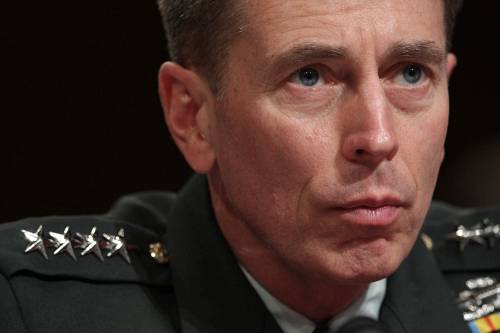Senators Press Petraeus on Deepening Ties to Pakistan
Obama administration wants Pakistan to cooperate in plans to confront growing violence in the region.
Jul 31, 202013.4K Shares789K Views
Gen. David Petraeus (WDCpix)
Pakistan emerged as a target of Capitol Hill criticism on Wednesday as key Obama administration officials explained their new strategy to confront growing extremist activity in Pakistan and Afghanistan.
The strategy’s call for deepening U.S. ties to the Pakistani government and military concerned some lawmakers. While no senator on the Armed Services Committee voiced opposition to the strategy, released Friday, several worried aloud to Michele Flournoy, the undersecretary of defense for policy, and Gen. David Petraeus, the commander of all U.S. forces in the Middle East and South Asia, that the Pakistanis were unreliable allies against al-Qaeda and its “syndicate” of extremism. Some wondered if the powerful Inter-Services Intelligence agency were still supporting elements of the Taliban — the Afghan Taliban were the creation of the ISI in the 1990s — and feared that additional aid and other mechanisms of cooperation that the administration is pledging to deliver to Pakistan will be misdirected or even benefit U.S. enemies.
Illustration by: Matt Mahurin
“We have a new democratic government, [along with] parts of the military, that wants to deal with the extremist threat,” Flournoy told Sen. John McCain (R-Ariz.). “Part of our challenge is to empower them.” Petraeus added that the administration’s entire strategy for Pakistan depended on Pakistan “embracing the idea that the biggest threat to their country is the internal extremist threat rather than the threat to the east,” referring to Pakistan’s historical enemy, India.
In the seven years since al-Qaeda’s leadership and the heads of the Afghan Taliban ensconced themselves in the tribal areas of western Pakistan following the 2001 U.S. invasion of Afghanistan, they have expanded and deepened their hold on portions of the country, which U.S. intelligence has assessed for two years is a “safe haven” for al-Qaeda to plan attacks on the United States and to destabilize the region. Additionally, a new indigenous Pakistani Taliban has arisen during that period and has launched numerous attacks against the Pakistani governments of Gen. Pervez Musharraf and his successor, President Asif Ali Zardari, including the capture of the Swat Valley 100 miles from the capital, Islamabad. The Pakistani military has been beaten in outright battles with the insurgents, and for years has worked out occasional ceasefires with them, which have been violated repeatedly. Flournoy, speaking specifically about Swat, said flatly that such deals were not in the U.S. interest.
In response, Flournoy and Petraeus testified, the Obama administration would launch a mentorship program with the Pakistani military to train some of its forces in counterinsurgency techniques, which Petraeus called a “counterinsurgency fund.” (Administration officials from President Obama on down have said that the U.S. combat troops will not enter Pakistani territory.) The program would “help develop those capabilities that truly” prove relevant to the fight against insurgents in western Pakistan, Petraeus said, with Flournoy calling it “absolutely critical to the success of this strategy.” It is unclear how many U.S. trainers will go to Pakistan, for what duration and at what cost.
The Obama administration is still developing benchmarks for judging the success or failure of its strategy — an incompleteness denounced by Sen. Susan Collins (R-Maine) — and Petraeus endorsed the idea of judging Pakistan by “their commitment to this threat that could literally take down their state.” He said that he had discussed reports of ISI complicity with the Taliban in his recent discussions with its chief, Gen. Ahmed Shuja Pasha, and would continue to do so. “There are accusations, frankly, some when you dig into them seem to be more ambiguous than on the surface but some of them are not,” Petraeus said, referring to alleged ISI-Taliban cooperation.
Flournoy conceded to Sen. Jim Webb (D-Va.) that the U.S.’s ability to secure Pakistan’s unambiguous cooperation against al-Qaeda was “an open question.” But she said the U.S.’s interest in not allowing western Pakistan to be a staging ground for attacks against the U.S. or a destabilizing force in the region meant “we need to test the proposition” through “a substantive offer of assistance and a committment to work with them.”
A major component of that offer is a forthcoming bill sponsored by the Democratic and Republican leadership in the Senate Foreign Relations Committee. Sens. John Kerry (D-Mass.) and Richard Lugar (R-Ind.) will introduce a bill in the coming days that will grant $7.5 billion in non-military aid to Pakistan over the next five years and condition U.S. aid to the Pakistani military on its efficacy in combating extremism in the western tribal areas.
“The purpose is to change a transactional, tactical, short-term relationship, which is the way Pakistan has seen the relationship, into a deeper, more committed, more long-lasting relationship that does not have to be dependent on who’s in power in Washington and who’s in power in Islamabad,” said Frederick Jones, spokesman for the committee. It is unclear when the bill will be introduced — which could come as early as today, though Jones was unsure — but the upcoming congressional recess and the pace of Senate business makes it unlikely to pass before late April at the earliest. Petraeus said the Kerry-Lugar bill was “of enormous importance” to the administration’s Afghanistan-Pakistan strategy.
The widely-respected general has emerged as a key player in Afghanistan-Pakistan strategy for the Obama administration, appearing as both salesman and public face of the war — reminiscent of his role for the Bush administration during the troop surge in Iraq, which he commanded. In his testimony, Petraeus was careful to grant credit to Gen. David McKiernan, the ground commander in Afghanistan. But Petraeus also spoke of the numerous roles he will be playing to support the strategy, along with Amb. Richard Holbrooke, the special envoy for Afghanistan-Pakistan, whom Petraeus called his “diplomatic wingman.”
Over the weekend, Petraeus attended a bull session of top military leaders at the behest of the chairman of the Joint Chiefs of Staff, Adm. Mike Mullen, to discuss how best to support what the administration calls its “Af-Pak” strategy.” He plans to meet with the Pakistani ambassador to the U.S., Husain Haqqani, in the next few days. And Petraeus said he and Holbrooke would convene an “on-site” discussion in Washington in the next several weeks with both civilians and military leaders scheduled to deploy to the region in order to gain “real synergy” between their efforts.

Hajra Shannon
Reviewer
Latest Articles
Popular Articles

